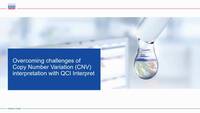QCI Interpret for Hereditary
Increasing the efficiency of diagnostic odysseys
524 views
Despite rapid cost reductions in sequencing technologies and an ever-increasing understanding of genetics, it takes about five years to diagnose a child with a rare disease. The mounting adoption of whole exome sequencing (WES) is helping to bridge this gap, allowing for variations in any gene to be identified, creating more opportunities for discovering a disease-causing mutation. Yet, the prolific method generates massive datasets, placing bottleneck pressure on the downstream variant analysis and interpretation. For WES to effectively increase the diagnostic odysseys of rare, undiagnosed diseases, the supporting variant identification and classification must be equally efficient with uncompromising accuracy.
In this webinar, we present a clinical decision support solution for efficiently filtering and assessing the pathogenicity of identified variants from WES data collected from undiagnosed patient cases. QIAGEN Clinical Insight (QCI) Interpret is a secure, cloud-based ISO-certified clinical support platform designed to help labs perform tertiary sequence analysis according to guidelines set by industry experts, such as ACMG, AMP, ASCO, and CAP. Using WES data generated from two test cases, we demonstrate how the QCI Interpret platform performs variant filtering and applies phenotype-driven ranking (PDR) algorithms to highlight the variants most likely to cause the respective disease. The PDR score is based on gene-disease associations found in the QIAGEN Knowledge Base. Then, QCI computes the ACMG classifications and AMP/ASCO/CAP tier-based actionability scores for each of the variants in the filtered list. QCI bases variant classifications on the evidence obtained from multiple sources, including full-text articles and public and private databases, all of which are contained within the QIAGEN Knowledge Base. We show how users can examine all of the evidence considered in the variant classifications before generating a final report.
Reducing the number of click-outs and rapidly compiling multiple levels of manually-curated evidence from multiple search engines and databases, QCI Interpret significantly scales NGS variant analysis and interpretation, leading to shorter time to discovery.
Speaker: Jim Hayes, PhD
Application Scientist, Clinical Products
In this webinar, we present a clinical decision support solution for efficiently filtering and assessing the pathogenicity of identified variants from WES data collected from undiagnosed patient cases. QIAGEN Clinical Insight (QCI) Interpret is a secure, cloud-based ISO-certified clinical support platform designed to help labs perform tertiary sequence analysis according to guidelines set by industry experts, such as ACMG, AMP, ASCO, and CAP. Using WES data generated from two test cases, we demonstrate how the QCI Interpret platform performs variant filtering and applies phenotype-driven ranking (PDR) algorithms to highlight the variants most likely to cause the respective disease. The PDR score is based on gene-disease associations found in the QIAGEN Knowledge Base. Then, QCI computes the ACMG classifications and AMP/ASCO/CAP tier-based actionability scores for each of the variants in the filtered list. QCI bases variant classifications on the evidence obtained from multiple sources, including full-text articles and public and private databases, all of which are contained within the QIAGEN Knowledge Base. We show how users can examine all of the evidence considered in the variant classifications before generating a final report.
Reducing the number of click-outs and rapidly compiling multiple levels of manually-curated evidence from multiple search engines and databases, QCI Interpret significantly scales NGS variant analysis and interpretation, leading to shorter time to discovery.
Interested in learning more?
Click here
Application Scientist, Clinical Products
Related videos
QCI Interpret for Hereditary
Overcoming Challenges of CNV Interpretation
Copy number variant (CNV) analysis has been part of clinical diagnostics for...
QCI Interpret for Hereditary
A breakthrough for rare disease: Completing the Clinical exome gap!
In its latest release, QCI Interpret for Hereditary extends its...
QCI Interpret for Hereditary
Shed light on Hereditary Disorders with QCI Interpret
In this webinar, we will demonstrate how QCI Interpret can improve your...
QCI Interpret for Hereditary
Solve Every Hereditary Disorder Case for All Types of Mutations
Despite incredible advances in genomics, the NGS data interpretation workflow...



